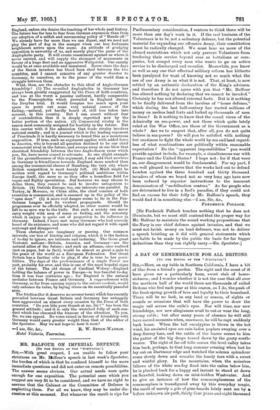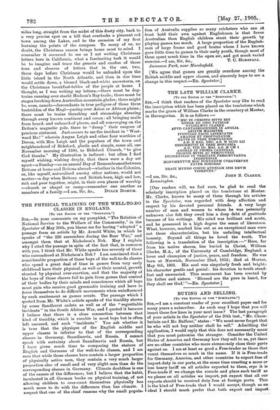[TO THE EDITOR. OF THE specraroa."] Sra,—Here, on my table
in Southern California, I have a bit of lilac from a friend's garden. The sight and the scent of it have given me a particularly keen, sweet stab of home- sickness ; and I wonder whether it is not the case that all over the northern half of the world there are thousands of exiled Britons who feel each year at this season, as I do, the push of the fresh spring growth of love and loyalty to their homeland. There will be no lack, in any land or season, of sights or sounds or occasions that will have the power to draw the magic veil across the exile's eyes. Nor will time, nor new friendships, nor new allegiances avail to cut or wear the long, strong cable ; but after many years of absence he will still have sacred moments when, unawares, he will be rapt suddenly back home. When the tall eucalyptus is blown in the hot wind, his anointed eyes see rain-laden poplars swaying over a deep Surrey lane, and the rattle of the leaves seems to him the patter of the big drops tossed down by the gusty south- wester. The sight of far-off hills across the level valley takes him back, perhaps, to that long summer evening when last he lay out on Dartmoor edge and watched the solemn splendour come slowly down and wreathe the lonely tors with a sweet and wistful glory. In the mountains, when the noiseless billows of the white sea-fog flood into the cation below him, he is plucked back for a happy sad instant to stand at dawn on Scawfell, looking down on mist-hidden Wastwater. And to give an instance of how the commonplaceness of the commonplace is transfigured away by this everyday magic, the smell of merely a pile of pine-boards lately sent me by a before unknown air-path, thirty-four years and eight thousand Miles long, straight from the midst of this dusty city, back to a. very precise spot on a bill that overlooks a pleasant red town among the Lakes, and to the occasion of my first learning the points of the compass. To many of us, no doubt, the Christmas season brings home most to mind. I remember it occurred to me as I sat writing Christmas letters here in California, what a fascinating task it would be to imagine and trace the genesis and exodus of those tons and sheaves of letters that in the one, two, three days before Christmas would be unloaded upon the little island in the North Atlantic, and then in due time would settle down, a blessed black-and-white snowstorm, on the Christmas breakfast-tables of the people at home. I thought, as I was writing my letters,--there must be dog- trains running over starlit Hudson's Bay trails; there must be stages lurching down Australian mountain-glades; there might be, even, camels—descendants in true pedigree of those three bestridden of the Magi—pacing over Asian or African plains ; there must be trains thrashing and steamships shearing through every known continent and ocean: all bringing mails from heard- and unheard-of places, and all converging on the Briton's magnetic pole, there to " dump " their cargoes of precious ointment. Just occurs to me the incident in "West- ward Ho!" wherein Amyas Leigh and other four worthies of Devon, with Mrs. Leigh and the populace of the town and neighbourhood of Bideford, gentle and simple, came all, one November morning of 1580, to Bideford Church, "to give God thanks." My illustration is indirect; but often I find myself wishing, wishing deeply, that there were a day set apart—a Sunday—as an annual Day of Remembrancejbetween Britons at home and Britons abroad—whether in the Colonies, or, like myself, naturalised among other nations, would not matter—a day when Britons and British-born, high and low, rich and poor together, might, in their own places of worship —church or chapel or camp—remember one another as







































 Previous page
Previous page